This guide to Greece food culture will prepare you for many culinary adventures! Here’s everything you need to know about experiencing incredible food in Greece.
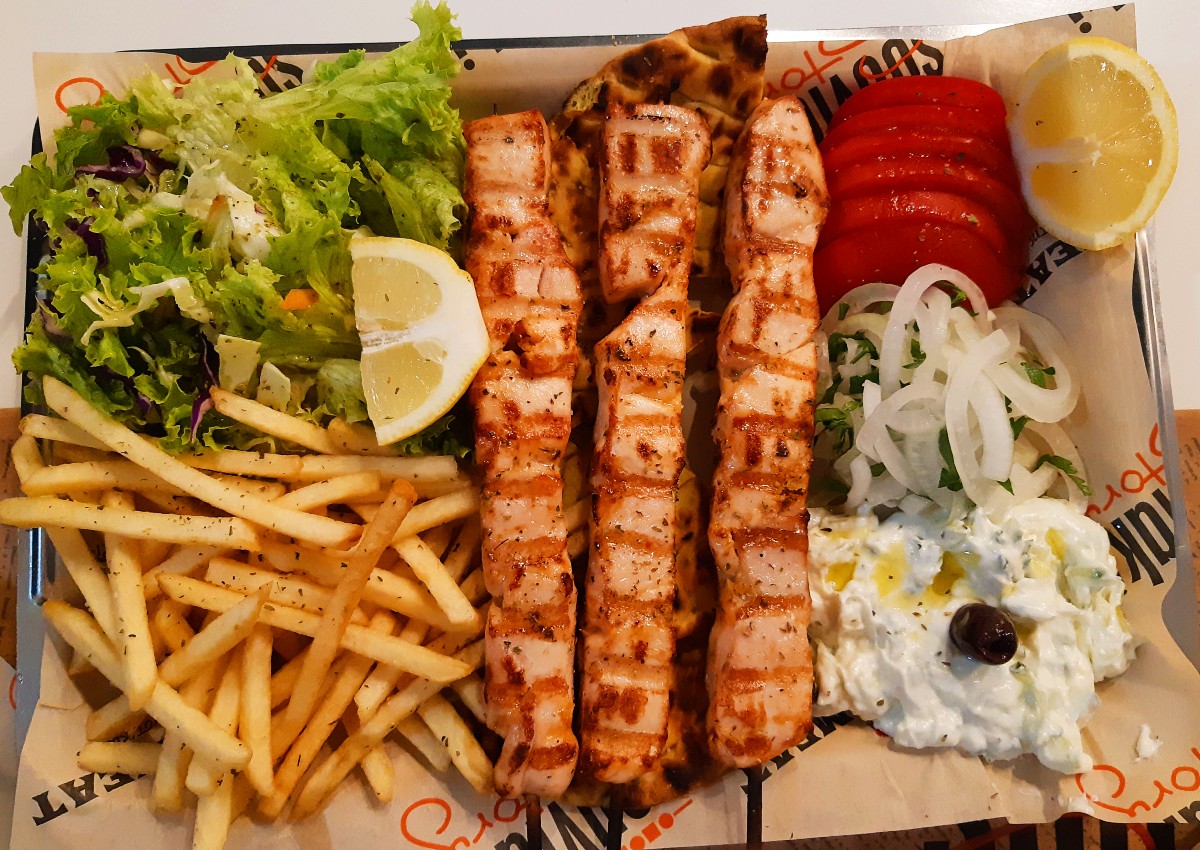
Greek Food Culture
Food is a huge part of Greek culture. There are literally hundreds of dishes! This guide to the food of Greece includes 50 of the most popular Greek dishes.
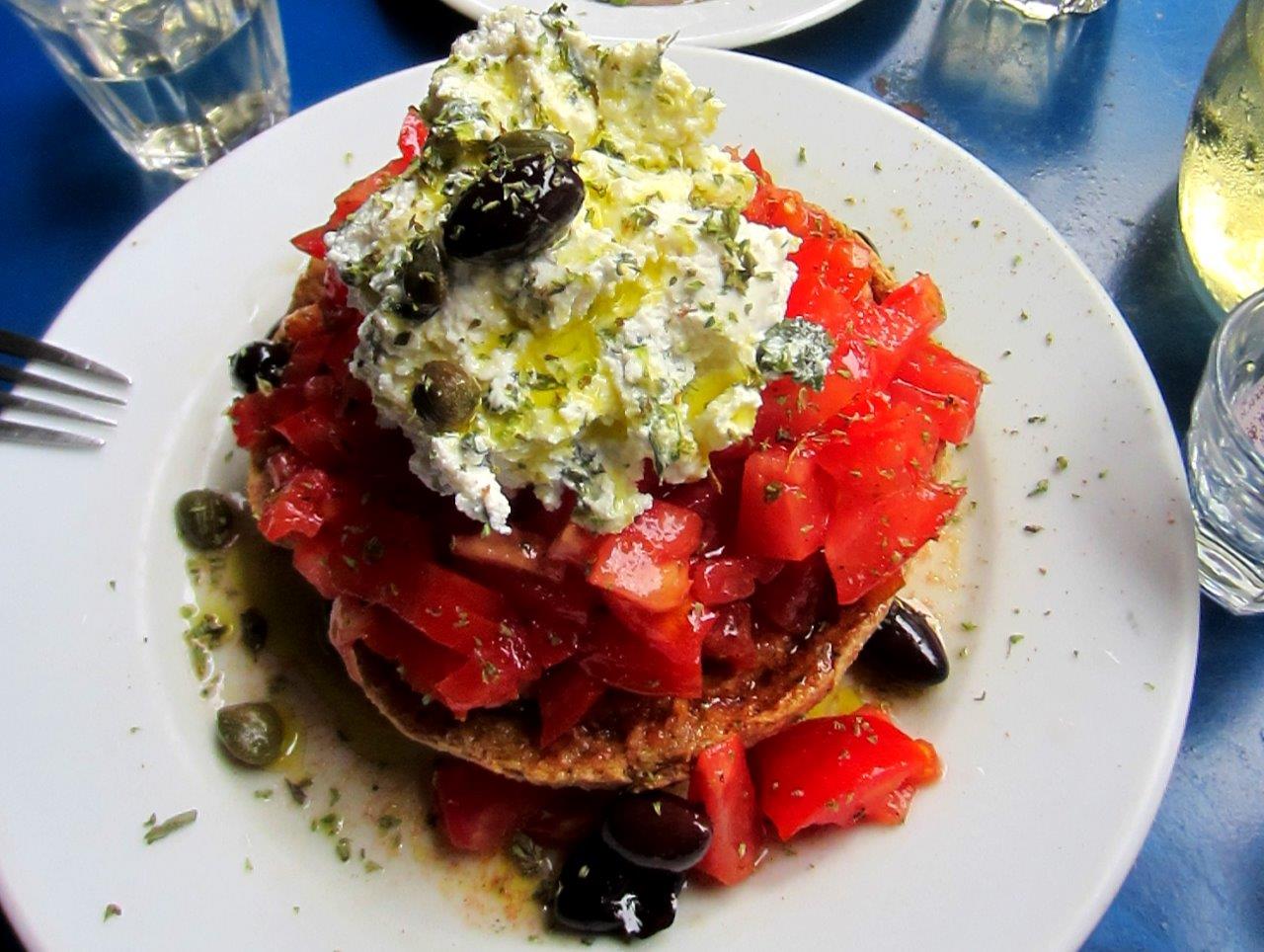
However, Greek food has to do with much more than just flavours and dishes. It’s all about the excellent ingredients, the lengthy procedure involved in preparing the food, and the culture of sharing dishes with others. Essentially, it has to do with bonding with others through one of life’s greatest pleasures.
Just to introduce myself quickly – I’m Vanessa from Athens. Like many Greek people, I grew up in an environment where family meals around the table were very important – and that is the essence of Greek food culture!
So, here is a short introduction to what makes food in Greece so special.
Greek food begins with extra virgin olive oil and feta cheese
Extra virgin olive oil and feta cheese! These are two of the most essential staples for any Greek person around the world, including myself.
Greeks take olive oil and feta cheese extremely seriously, and are not prepared to use substitutes. In fact, there are very few Greek dishes where olive oil is not used. And, as research suggests, it’s good for you!

As for feta cheese, to the best of my knowledge, it cannot be replaced with any other cheese. While I’ve found many similar-looking cheeses all around the world, they are just not the same. I have tried to substitute feta with another cheese plenty of times – and failed miserably!
By the way, feta is just one of the few hundreds different types of cheese that you can buy in Greece. If you ever order a popular fried cheese dish called saganaki, this won’t have any feta cheese in it.
Greek cuisine has a variety of dishes
Traditionally, food in Greece is made from fresh ingredients, like vegetables, various types of horta, pulses, nuts, Greek yogurt, cheese, grains, fish and small amounts of meat. Fresh fruit, honey and spices are popular as well.
A usual meal at a taverna will typically include several small dishes (meze) which are shared with everyone, just like the bill. There is a large variety, and everyone gets to taste everything.
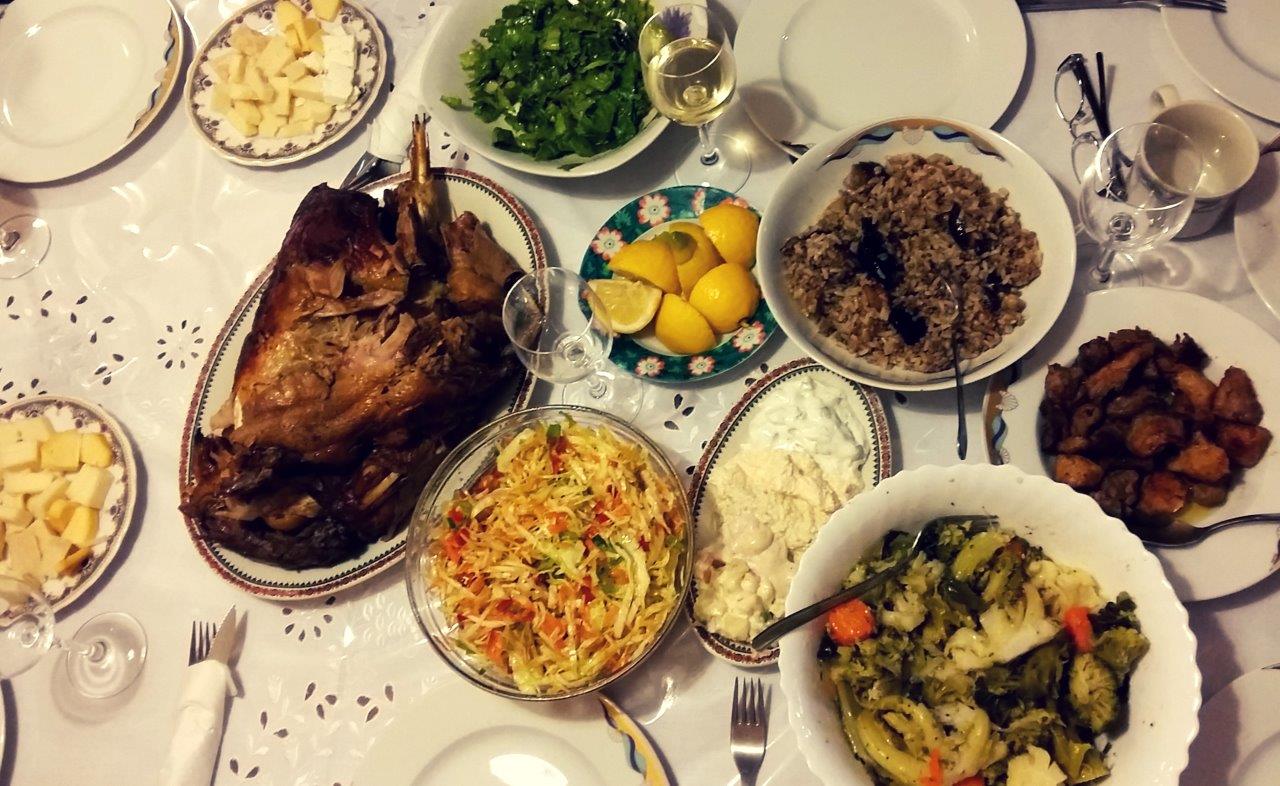
But that’s not all. The Mediterranean diet, where Greek cuisine falls under, is one of the healthiest in the world! Due to the quality and variety of ingredients, Greek dishes are full of antioxidants, vitamins, minerals and healthy fats, which help maintain good health.
Incidentally, many Greek recipes have their roots at the ancient times. As the fascinating myth of how Athens took its name clearly shows, olive oil was super important for ancient Greeks!
There are plenty or Turkish and Arab influences as well – just think of the classic baklava or the warm pita bread.
Traditional Greek cooking isn’t about exact quantities
Most Greek cook books offer quantities when it comes to recipes. However, most Greek people, especially yiayias (grandmas) don’t really measure quantities when cooking.
The best measuring system in Greece is “with the eye”, i.e. “however much it takes”. Therefore, the question “how many olives go in a Greek salad?” doesn’t really have an answer.
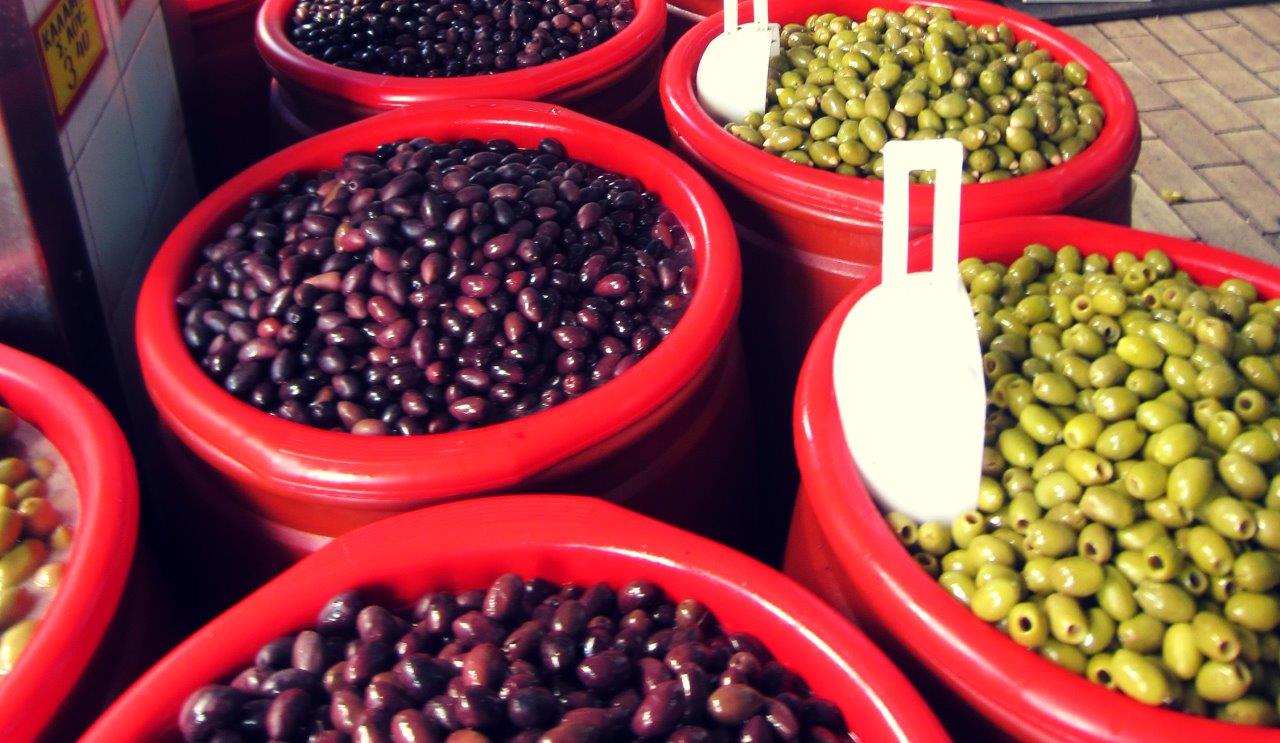
Similarly, if you ask for 300 gr of feta cheese at the supermarket, don’t be surprised if you end up with a half kilo packet. It’s assumed that it will be eaten!
Traditional Greek food takes time to prepare
Many traditional Greek dishes take several hours to prepare. This is what makes Grandma’s food delicious!
I still remember my own yiayia’s version of a home-made tiropita, or cheese pie. Rather than store-bought phyllo pastry, she used her own handmade puff pastry, following her mother’s recipe. It was just divine! Her Greek meatballs and Greek spinach pie were also out of this world…
Another good example is the famous Greek moussaka, a combination of layers of potatoes, aubergines, minced meat, tomato sauce, and a creamy bechamel sauce on top. Or kleftiko, a lamb dish often cooked with garlic, herbs and lemon juice.
And not to talk about gemista, tomatoes and bell peppers stuffed with rice, pine nuts and raisins, and served with potatoes. But as we say here in Greece, all good things take a while to happen.
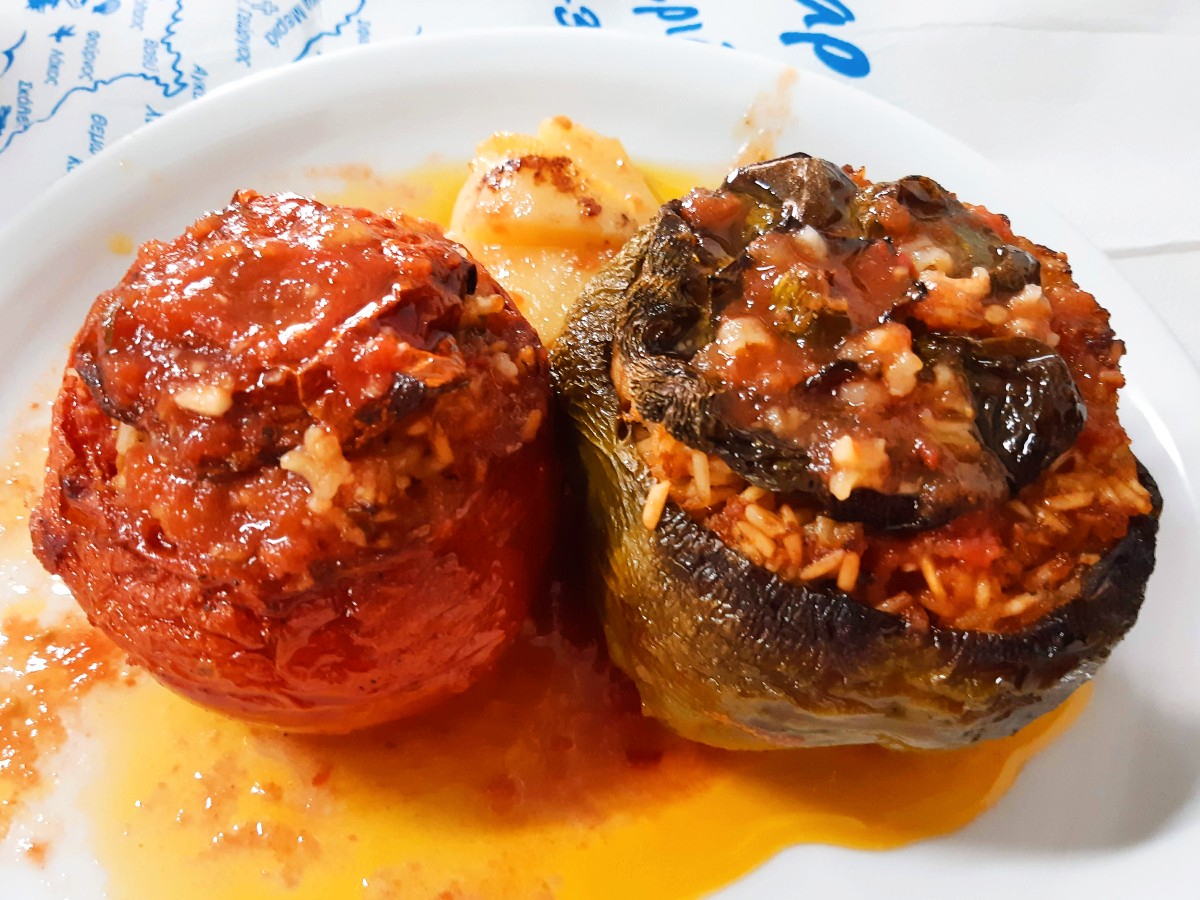
During important holidays, like Greek Easter, food preparations can go on for days – and time spent consuming that food can be equally long.
After all,“He who receives his friends and gives no personal attention to the meal which is being prepared for them, is not worthy of having friends” (Jean-Anthelme Brillat-Savarin).
Greeks love eating with friends
Eating food in Greece is a big thing. Dining out is a social event, where you get to share a lot more than just food, similarly to the Greek coffee culture.
To quote the ancient Greek philosopher Epicurus, “We should look for someone to eat and drink with before looking for something to eat and drink, for dining alone is leading the life of a lion or wolf”.
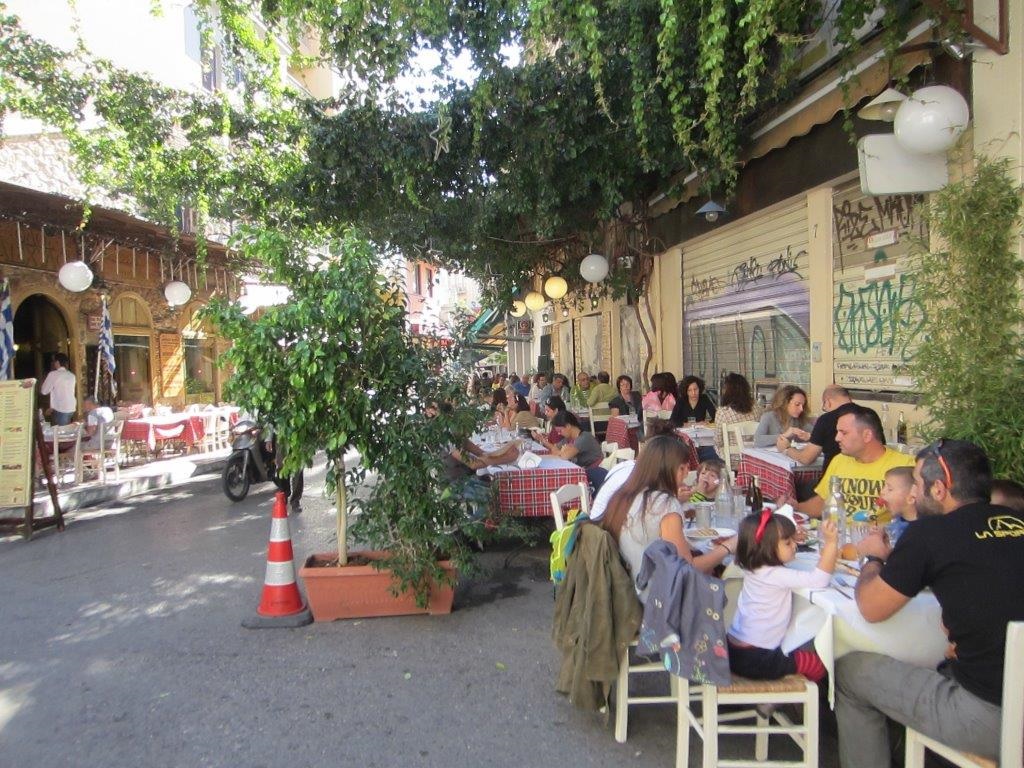
Meals that go on for hours are very typical of Greece. Food, wine and good company make for a great combination, and an ideal setting to discuss everything under the sun!
This is quite similar to the ancient Greek symposia, the gatherings that took place at people’s homes. Plato, the famous Greek philosopher, wrote his work Symposium based on these banquets.
To experience a meal like Greeks do and learn more about local ingredients, you can take a food tour in Athens, or a food tour in Santorini.
There are also cooking classes, for example the Perivoli farm experience and cooking class in Naxos.
Greeks have their meals later than most other cultures
The hours to eat food in Greece are quite different than in most European countries. First time visitors might have a hard time adjusting!
Depending on their daily routine, a Greek person might skip breakfast. Instead, they could have a coffee or two and a small snack like a koulouri (type of semi-sweet bread with sesame) during the morning.
Most Greeks will have some form of lunch around 2 pm. Strangely, official lunch breaks at work are not as common as in some other countries.

Dinner time in Greece is usually late, after 9 pm, especially when it’s a dinner out with friends. In summer, some people will watch an evening film in an outdoor cinema, and then go for their evening meal at around 11:00 pm!
Note: On weekends, people can be seen having a meal at 4 or 5 pm. This is neither a lunch, nor a dinner – it’s something in between, depending on how late they were up the previous night!
There are many different places to eat food in Greece
When visiting Greece, people are often surprised by how many different types of restaurants we have.
Here are some of the most common types of restaurants, which, confusingly, are often very similar to each other!
- Taverna – A basic restaurant with a huge menu, many meat dishes, and, typically, friendly prices > more info here
- Psarotaverna – A restaurant offering many fish and seafood dishes
- Estiatorio – A restaurant slightly more upmarket than a taverna, with a huge menu
- Magirio – A basic taverna offering hearty, traditional Greek dishes and friendly prices
- Inomagirio – A basic taverna offering hearty, traditional Greek dishes, house wine and friendly prices
- Mezedopolio – A Greek restaurant serving mostly small dishes, where the emphasis is on the company and the drink, rather than the amount of food
- Ouzeri / Rakadiko – A small mezedopolio serving food to accompany our strong alcoholic drinks, ouzo or raki
- Koutouki – A small, cosy taverna with an emphasis on house wine
- Souvlatzidiko / Psistaria / Psitopolio – A place offering souvlaki!
Of course, the ultimate experience of eating food in Greece, is to have Greek food in a Greek home, especially if the food is made by a yiayia!
FAQs about Greek food culture
Here are a few more questions often asked by visitors:
Why is food important to Greek culture?
Food is a very important part of the culture in Greece. A meal with friends or family is a lot more than just food. It is also a way to share the dishes, discuss, socialize and enjoy other people’s company.
What is the national food of Greece?
One of the most iconic Greek foods is moussaka, a combination of minced meat, potatoes and aubergines topped with a creamy layer of bechamel sauce. Other famous Greek dishes include souvlaki, tzatziki, cheese pie, spinach pie, and Greek salad.
Why is Greek food so good?
The Greek cuisine is rich and varied. We use plenty of fresh ingredients, like good quality vegetables and freshly caught fish. Most Greek dishes are simple in terms of ingredients, yet amazingly flavorful!
Is Greek food healthy?
Traditionally, Greeks follow the so-called Mediterranean diet, which is one of the healthiest in the world. The main ingredients are vegetables, nuts, seeds, legumes, fresh fish, bread, cheeses, olive oil and small quantities of meat.
What influenced Greek cuisine?
Greek cuisine has many influences. Some contemporary dishes, like fish or meat dishes, were also eaten in ancient Greece. Greek food has been influenced by Middle Eastern and Mediterranean cuisines, most notably that of the Ottoman Empire.
What time do Greeks have dinner?
Greeks usually have a late dinner, after 9 or maybe 10 pm.
More about Greece and the Greek culture
If you’ve enjoyed this article, you might like to read these other ones about Greek culture:
- How to order food in Greece
- Tipping in Greece
- Ten things you should know about Greece
- Religion in Greece – Churches, Greek Easter and Christian names
- Greek customs and etiquette
- Why Greek cats are so cute!
- A guide to Greek drinks
- Easy Greek words to learn
- Everything you wanted to know about the Greek flag

Hi! I am Vanessa from Athens, and I love helping people discover more about my country. I grew up among two grandmothers who both loved cooking, and have had my fair share of super long meals with family and friends. If you’ve ever enjoyed a long meal with great company in Greece, I’d love to know what you thought, so please leave a comment below! Follow me on my social media:
- Facebook page and very active Facebook group
- Amazon
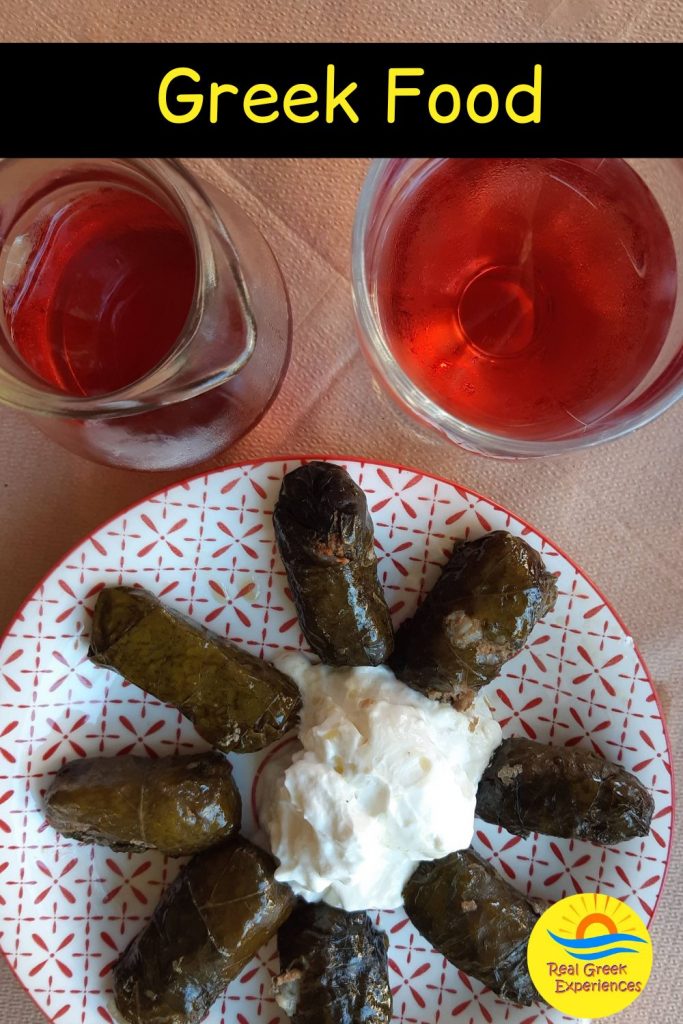

It’s great to know that most of the authentic greek food has a lot of olive oil and feta cheese in the ingredients. My partner and I are trying to eat much healthier this year and it’s really important that we have a real Mediterranean diet. WE love the ingredients that are in Greek food because they seem to be really great for our bodies.
That’s great! Yes we love Greek food, and we eat quite healthy as well! We are thinking to try and include a few recipes in the website – is there anything you’d be interested in?
You commented that you don’t know of any Greeks who like retsina. I lived in Greece 20 years, my wife is from Thess, her native village is Meliki. I can tell you that in Imathias they love retsina – Malamatina. Me, NO!!! However, the tsipouro from Meliki and Kouloura are fantastic. Some of the locals will also use a bulb of onion in the distillation process. You can’t taste the onion, but the slightly velvety texture and smooth, warm flow of the tsipouro going down is an absolute pleasure. You should visit BTW: Meliki prides itself on its fasolada…best in Greece they say. And be sure to get some revani from Veria.
Thank you Roger! I’ll definitely keep these ideas in mind when we next go to Thessaly – you are right, the tsipouro from these areas is very well known 🙂